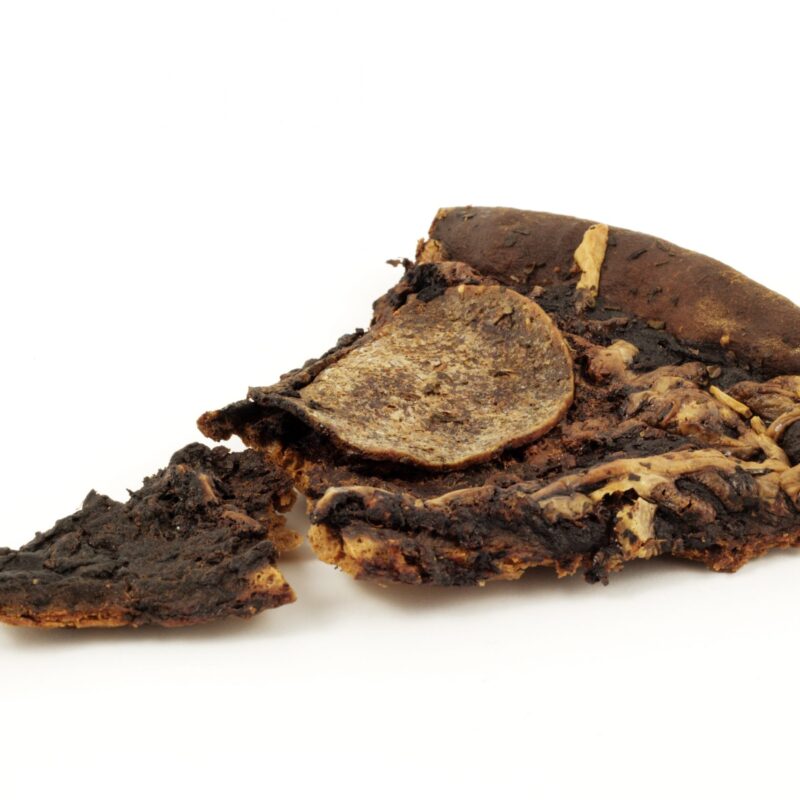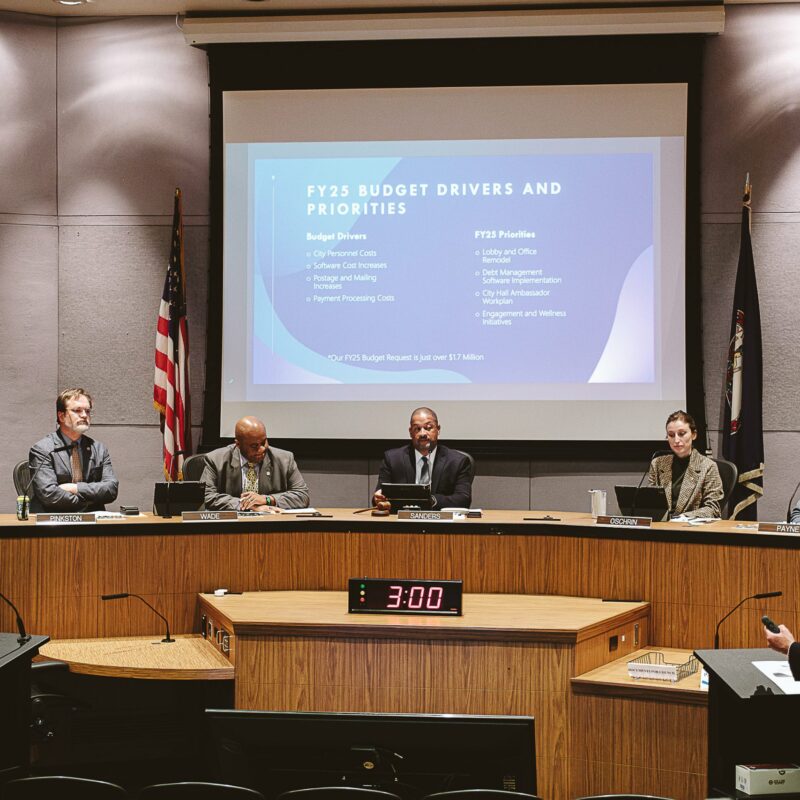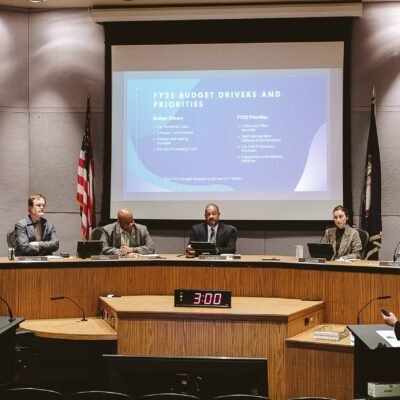She spent the first part of her morning running down the list of people she’d expected to hear from. “Hello. It’s Debbie Wyatt. Have you been trying to call me?”
The phone system at Wyatt’s office at 300 Court Square is still down at 9:30am, her voicemail box is uncharacteristically empty, and Wyatt is expecting her client and two lawyers from the defendant’s side to arrive in half an hour for depositions.
 Wyatt, who calls herself "nervy," took up her first case against institutional injustice when she was in grade school. |
Her assistant keeps passing cups of coffee across the front counter from a small pot behind her desk like a dutiful factory worker slogging bolts. The lights on the phone in the conference room brighten to red sporadically, then go dark. When the phone jangles briefly, Wyatt stalks over to it and picks it up. “Wyatt and Associates.” Hearing silence on the other end, she flings the receiver back on its base.
Frustrated but cheerful, Wyatt prepares for depositions the way a housewife prepares for guests. A box of Spudnuts donuts sits on the conference room table. Wyatt lays a stack of napkins neatly beside it. She doesn’t seem to need a lot of time to prepare her thoughts—you’d guess she could launch into an argument full-force at any moment.
Wyatt wears a striped blue skirt suit and navy blouse with white dots. She has already removed the jacket and thrown it over a chair in the conference room.
In heels, Wyatt nears 6′, her long legs and athletic build giving no hint of her nearly 28 years of sitting over legal texts. She moves through her office with frenzied agility, sitting down to chat, then leaping from her seat to speak to her assistant.
The phone rings—finally, a call getting through. On the line is Jermaine Thurston, Wyatt’s client, a man who shot another man on S. First Street this summer. The 22-year-old says he was assaulted by 21-year-old Lamont Reaves, who had allegedly threatened him before. Thurston shot Reaves from about 2′ away with the gun he had started carrying for self-protection. It was Thurston’s first crime, and the City’s first murder charge this year.
Wyatt’s voice warms and sweetens when she speaks to him. “I’ve been asking your mom to send me some info, so you’ve got to encourage her, O.K.?” She hangs up and clicks her tongue. “Poor little guy.”
She is barely off the phone with Thurston before another client needs her. This client, who is suing the Rivanna Water and Sewer Authority for the death of her husband at the former Ivy Landfill, has arrived at her office. Wyatt takes a moment alone with the client before getting her settled into the conference room.
“They always come in twos,” Wyatt mutters as she glances out the window at the lawyers walking toward her office.
The approaching pair could be a Vaudeville team: one tall, dark and thin, the other short, squat and grey, both encased in lawyerly suits with big, square, leather briefcases.
The two attorneys enter the conference room and grin at Wyatt’s client. “Hello Mrs. So-and-so. How are you today?”
The client dabs her eyes and eats her Spudnut.
Wyatt, a seasoned lawyer, leans over and whispers something to her, readying herself for a fight. A heavy wooden door closes behind her.
On October 12, 1984, just after 11pm, crowds were mobbing outside the Virginia State Penitentiary in Richmond. As she emerged from the prison, police tried to hold Debbie Wyatt back from the throngs of people outside holding signs that read “Burn, baby, burn.” The death chamber had been virtually bustling with spectators. At only the second execution in Virginia since capital punishment was reinstated, more than a dozen people were allowed in the chamber while the crowd gathered outside the prison. Everyone, it seemed, wanted to be there the night Linwood Briley, the monster, was fried for murder.
Trying to break through the horde to get to her car, Wyatt could still smell Briley’s burning flesh, see his skin bubbling as he died in the electric chair.
Briley was well known for leading the largest death row prison break in the United States at Mecklenburg Correctional Center in Boydton, Virginia. On May 31, 1984, Linwood Briley and his younger brother, J.B., took prison guards hostage and broke free with four other inmates.
The Brileys were recovered about two weeks later in Philadelphia.
The brothers from Northeast Richmond had displayed disturbing, violent tendencies as children. At Mecklenburg, they were both serving multiple life sentences and had each received the death penalty for a killing spree that lasted for eight months from 1979 until 1980.
With a gang of cohorts who had all pleaded to lesser sentences, the Brileys killed 10 people, including radio disc jockey “Johnny G” Gallaher, a pregnant woman (whom Linwood raped), her 5-year-old son and a 17-year-old man whose skull Linwood crushed with a cinderblock.
By the time they were executed in 1984 and 1985, the Briley brothers were among the most hated men in America.
Wyatt then, just six years out of law school, had become Linwood’s attorney when his fight was on its last legs.
She took the case post-conviction. She got his death penalty stayed for a while and tried to get him a new trial.
“You want to talk about hate,” Wyatt recalls. “People hated me for that.”
Briley spent his last moments with family members. But as his attorney, Wyatt was the only one from Briley’s side to witness his electrocution.
These days, Wyatt is used to finding herself alone on her side of the fence. Though she has announced her retirement, pledging to take on no new cases, her caseload remains full of the type of constitutional and civil rights matters that people take personally.
Wyatt recently won $4.5 million for the family of Frederick Gray, a man who was shot by an Albemarle police officer in 1997.
She’s also representing Dena Bowers, a woman taking on UVA for her alleged wrongful firing over an e-mail that was critical of UVA’s chartered restructuring.
Wyatt also stands behind a civil rights suit on behalf of almost 200 black men who were swabbed for DNA in 2003 and 2004 when Charlottesville police were desperately trying to find the serial rapist (who remains at large).
To her clients, she’s the hope they need. To the public, Wyatt is an ambulance chaser, a friend to monsters, a mystifying advocate on cases no one else will touch.
Wyatt is also considered by some to be the ultimate betrayer of fellow women—she’s currently representing a man who was wrongly accused of rape by a UVA law student and is seeking $750,000.
 Some consider Wyatt an ambulance chaser, but she’s made progress with hard cases like Dena Bowers’ suit against UVA. |
Wyatt thought twice before taking that case. Chris Matthew was dragged into police custody shortly after a rape occurred near Jefferson Park Avenue. While Matthew, who is black, stood in the headlights of police cruisers, the victim, a white woman, identified him by the sound of his voice. Matthew spent five days in jail without bond as the public speculated on whether he was the serial rapist striking again. Eventually, DNA evidence cleared him. Wyatt has argued that the student was not raped (although subsequently another man pleaded guilty to the charge), and that women should be held accountable for their accusations, even in stressful situations.
After taking the Matthew case, Wyatt noticed prosecutors would avoid her on the street. Other lawyers expressed outrage at Wyatt’s position on the case. Albemarle Delegate Rob Bell even sponsored—and Charlottesville Delegate David Toscano went along with—a piece of window dressing legislation aimed at preventing lawsuits like Matthew’s.
Wyatt says she doesn’t ask for these types of cases. She doesn’t have to reach out to gain a new client when she hears about an injustice—people simply know that she’s the one to call. Why did she take on the Matthew case? “Nobody else would take him,” she says. “We know that no one else would take that case.”
The Red-Land Club is marked with a horseshoe and a simple plaque on a brick building at 300 Park St. It’s charmingly located in the old Swan Tavern, a building with a history going back to Jack Jouett’s famous ride.
Something about the Red-Land Club drives Wyatt up the wall. It could be its all-male exclusivity, its archaic aristocratic mystique, its location, flags flying in plain view from the windows of Wyatt’s office, the sign reading “THE REDLAND CLUB” garnering the attention only of those in the know.
Or, it could be that when Wyatt began arguing cases in Court Square, the prosecutors and judges would rub elbows at the men-only club during jury recesses, letting Wyatt know she’d never quite be able to play with the big boys.
In the early 1980s, Wyatt was one of a few female attorneys in town, and the only female criminal litigator. Back then, Wyatt says, the judge was always waiting for her to cry during trials. At the end, he would be sure to tell her what a good job she’d done. Usually, Wyatt thrived at being so underestimated.
In 1986, Wyatt was working on a rape case with co-counselors Dan Atkins and the bow-tied Jim Camblos, now the Albemarle Commonwealth’s Attorney and one-time president of the Red-Land Club. It was a tense case—Wyatt was defending a young man, Michael Barker, who had been accused of raping a woman he claimed he had never met before. Barker had already spent two and a half years in jail waiting for his appeal, and it was possible the woman was fabricating the whole story. Wyatt was emotionally invested in Barker’s innocence, and the day the jury recessed to decide a verdict was one of the hardest of that trial.
At the break, the judge and prosecuting attorneys all headed over to the Red-Land Club to smoke and play cards. Wyatt awaited the verdict in her office.
Today, a sunny day in Court Square, Wyatt wonders out loud what the male attorneys do in there. She supposes they sit, play chess and, puffing her chest and furrowing her brow imitatively, “enjoy the company of other men.”
“Like the Greeks with smoking jackets,” I offer.
“Right, only they’re not athletic,” Wyatt quips.
 |
The idea behind the Red-Land Club makes sense. It was a place where lawyers could rest between trials and let off some steam among other Court Square regulars without having to return to their offices. Though reputedly made up of Charlottesville’s crème-de-la-crème, the club, described in 1906 as “the swell and aristocratic club of Charlottesville,” where “the F.F.V’s [First Families of Virginia] of the masculine gender meet o’nights in executive session,” has no history of philanthropy or doing anything, really, other than throwing an annual party and receiveing men of leisure.
As late as the 1980s, the then all-white club counted more than 200 members, according to Daily Progress articles provided by the Albemarle-Charlottesville Historical Society.
Today, if the club’s members are numerous, they don’t admit it. Talk about the Red-Land Club has receded to the periphery of Court Square life.
Still, the whole idea of the Red-Land Club gets under Wyatt’s skin. She can’t talk about it for long without wanting to cause a little mischief.
“Let’s go over there for a second,” she says, her eyes sparkling. Leaving her work, she dashes into the morning sun, across the brick-lined street. I have no choice but to follow. Looking over my shoulder, I trail Wyatt down a short block to a door, painted blue. The door, almost flush with the building’s brick façade, looks private. No sound emits from the rooms behind it.
To our surprise, the door is unlocked, and we two women step inside the club.
The Red-Land Club smells as old as its principles—sweet wood floors and Virginia dampness and musty books. A striped tie with crests too small to decipher is framed under dusty glass on the wall. Documents cataloguing “Past Presidents of Red-Land Club” in calligraphy hang adjacent. Sunlight filters in through the windows, the end of the hallway is dim.
We can see a room off to the right, a reading room with stuffed sofas and a variety of newspapers, and another room, farther down the hall that was used for playing cards in at least as late as the 1980s, and probably still, and a banister leading downstairs to the game room.
But we can’t go any further; a locked inner door bars our way. Wyatt attacks the knob with surprising aggression, clicking the combination bolt one way, then another, rattling the door. But the stubborn thing seems to be woman-proof. Then she sees a gentleman she knows.
“Oh! Hank!”
Wyatt is surprised to see him—Hank Childress, an attorney she respects, in this place.
“You still come in here? What do you do?” Wyatt questions.
“Read the paper,” he shrugs.
He’s friendly to us, shakes our hands, but it’s clear we’re not getting past his navy blazered shoulders. He’s got himself wedged between the wood and glass double doors.
On a different day, one could imagine Wyatt talking her way in, or maybe just body checking the guy and showing herself around.
But, not today—she is retiring, after all. Getting into the Red-Land Club after all these years hardly seems worth it.
The floor creaks a weary sound as we see ourselves out.
As a schoolgirl in coastal Maryland, Wyatt would sit at her desk and notice some of her classmates didn’t have any shoes. When spring came, Wyatt’s teacher announced the school’s May Day celebration. The kids without footwear wouldn’t be able to participate.
Wyatt argued at length that it was unfair. Though she was only in elementary school, in typical fashion she thought she could change the teacher’s mind.
Like today, Wyatt wasn’t exactly called a hero back then. She self-describes with terms like “nervy,” and “problem student.” These days, among the legal crowd, people find Wyatt, at the very least, inconvenient.
“I can’t say I don’t get some pleasure out of mixing it up,” she says.
Wyatt’s office is classically lawyerly, with shelves of books in brown, black and burgundy, embossed in gold. The walls are a stately orange-brown. A big, solid wood desk spreads out at the back of the room. There is another wooden table topped with a traditional lawyer’s scales and exotic-looking artifacts.
Her desk is stacked with files, a tiny laptop computer allowing plenty of room, it seems, for intense study and a heavy caseload.
Sitting atop a stocked bookshelf is a dried-up cow skull looking both ominous and out of place, a leftover maybe from a Western film. The skull was a gift from a lawyer friend—he said it looked like what’s left of her opponents when she’s through with them.
Her office is not all grit, though. As in the courtroom, Wyatt neither disguises her femininity nor flaunts it. Photos of her family are around. On one wall hang some large portraits of her sons that Wyatt painted when they were young.
Despite being a professional rabble-rouser, Wyatt seems to have a pretty normal family life. Her husband, entrepreneur Rick Wyatt of architectural detail company Gaston & Wyatt, is more laid-back than his wife. According to Wyatt, he wants what will make her happy, including supporting her retirement. “I’m all for it,” he says. “She has a lot of stuff she’s been wanting to do.“
Since she’s begun scaling back her work, her husband is “starting to see a much nicer Debbie,” Wyatt says.
Wyatt’s 20-year-old son is a student at the University of Michigan. Her 18-year-old still lives at home. Like any mother, she worries about curfews and discipline in his last months before college.
Wyatt jokes that criminal law would be a manic depressive’s perfect profession—you’re either alone, buried in research, or arguing relentlessly in the spotlight. It’s always a fight, but to Wyatt, law wouldn’t be law without the fighting.
A back room hints at the life Wyatt hopes to pick up after she retires. Wyatt’s office occupies the old Eagle Tavern, a building that’s been around since Thomas Jefferson practiced law in Albemarle. The room where she keeps her gallery is venerable-looking, with crown mouldings and an old-fashioned fireplace painted white. Gold-framed paintings line the walls almost from floor to ceiling. Wyatt can explain the style and her experience painting each one.
When she retires, she’ll try to start a gallery in her office or in a new space. She also hopes to find a forum for her writing. There are far too many plea bargains, too much power in the prosecutor’s office and too much trial-by-ambush in criminal proceedings, Wyatt says, and she’d like more people to know.
Until then, Wyatt’s desk remains cluttered with files bearing names like Bowers, Thurston, Matthew, Gray. Wyatt expects she’ll finish up her cases early next year.
She encounters friends in Court Square now and then who jibe her about her retirement as if they don’t believe she’ll be able to stay away from the legal boxing ring. Wyatt admits—maybe she won’t. Her husband says it’s likely she’ll continue legal work “if she perceives that an injustice is being done to somebody.”
But, seeing a piece published about her retirement might help her to stay away. “This is good that you’re doing this,” Wyatt says. “This makes it real.”





